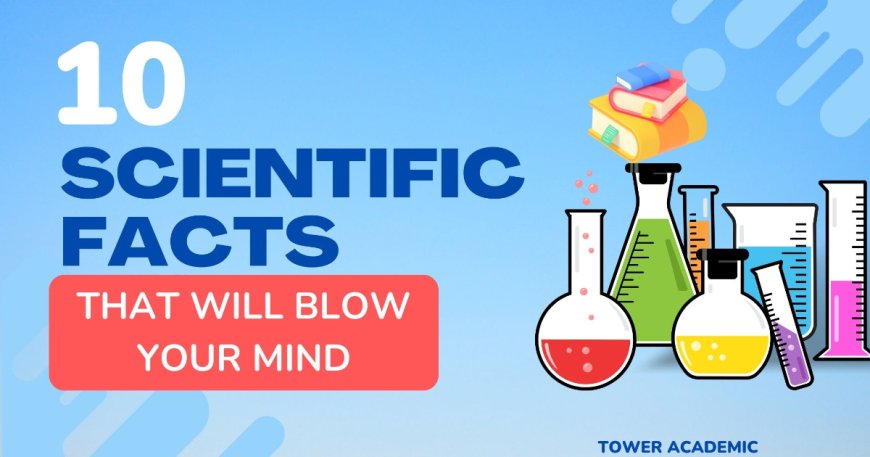10 Amazing Science Facts That Will Blow Your Mind
10 Amazing Science Facts That Will Blow Your Mind" is an engaging compilation of intriguing scientific facts that highlight the remarkable and often surprising nature of the world and universe we inhabit.

10 Amazing Science Facts That Will Blow Your Mind" is an engaging compilation of intriguing scientific facts that highlight the remarkable and often surprising nature of the world and universe we inhabit. These facts span a variety of disciplines, including biology, chemistry, and astrophysics, serving to spark curiosity and encourage further exploration of scientific concepts. By uncovering little-known truths about human anatomy, environmental processes, and the cosmos, this article underscores the importance of science in our everyday lives and its capacity to inspire wonder and appreciation.
Notably, some of these facts challenge common misconceptions, such as the idea that rainforests are the primary source of the Earth's oxygen—an honor that actually belongs to the ocean, which produces over half of our breathable air through marine organisms like plankton. Other astonishing revelations include the brain's high water content, the ability of water to exist in three states at once, and the fact that light behaves differently in various mediums, affecting our perception of color. These facts not only demonstrate the complexity of natural phenomena but also emphasize the interconnectedness of different scientific fields.
Controversies surrounding these facts often stem from their implications, such as the discussions around the significance of dark matter and dark energy, which make up approximately 95% of the universe yet remain largely unobserved. Additionally, the implications of microbial life in soil challenge our understanding of ecosystems and highlight the essential role these organisms play in sustaining life. As science continues to evolve, these captivating facts provide a glimpse into the ongoing quest for knowledge and the mysteries that still await discovery.
Overall, "10 Amazing Science Facts That Will Blow Your Mind" serves as a testament to the marvels of science, inviting readers to delve deeper into the wonders of the natural world. Whether one is a student, educator, or simply a curious individual, these facts offer an exciting entry point into the broader field of scientific inquiry, encouraging ongoing exploration and discovery.
Engaging Science Facts
Science is full of intriguing facts that not only captivate our attention but also expand our understanding of the world around us.
The Human Stomach's Power
One of the most surprising facts about the human body is that the stomach can dissolve razor blades. This incredible capability is due to the strong acidity of gastric juice, which has a pH level between 1.0 and 2.0, making it powerful enough to break down metals[1][2].
The Ocean's Role in Oxygen Production
While many often think of rainforests as the lungs of the Earth, it is actually the ocean that produces the majority of our planet's oxygen. Marine organisms like plankton and seaweed are responsible for generating over half of the oxygen we breathe, highlighting the ocean's critical role in sustaining life[3][1].
The Speed of Light
Light travels at an astonishing speed of approximately 299,792 kilometers per second (186,000 miles per second). To put this into perspective, it takes light about 8 minutes and 17 seconds to reach Earth from the Sun, which is a testament to the vast distances in our solar system[4][2].
Water's Unique Properties
Under specific conditions, water can exist in three states simultaneously: solid, liquid, and gas. This phenomenon, known as the "triple point," occurs at a precise temperature and pressure, showcasing the unique characteristics of this essential substance[1][2].
The Universe's Composition
A staggering 95% of the universe is made up of dark matter and dark energy, which remain largely unobserved and unexplained. Visible matter, such as stars and planets, constitutes only about 5% of the universe, leaving many mysteries still to be unraveled in the field of astrophysics[2][5].
Trillions in a Drop
A single drop of water contains approximately 1.5 sextillion molecules, demonstrating the sheer scale of molecular chemistry. Each water molecule consists of two hydro- gen atoms and one oxygen atom, emphasizing the complexity of even the simplest substances in nature[2][5].
The Brain's Composition
Remarkably, the human brain is composed of about 75% water, which is crucial for its function. This water content aids in electrical activity, temperature regulation, and provides cushioning against impacts, underscoring the importance of hydration for cognitive health[2][5].
Light's Behavior in Different Mediums
When light passes through materials such as water or glass, it slows down. For instance, light travels about 25% slower in water compared to its speed in air. This phenomenon is due to the interactions between light and the atoms in the medium, affecting how we perceive light and color[2][5].
These fascinating science facts not only inspire curiosity but also deepen our appre- ciation for the complexities of our world and the universe beyond. Whether you're
Lesser-Known Science Facts
The Weight of Clouds
While clouds appear light and fluffy, the average cumulus cloud can weigh up to a mil- lion pounds. This is roughly equivalent to the weight of the world’s largest passenger jet when fully loaded. Despite their substantial weight, clouds float because the air beneath them is denser, allowing them to remain suspended in the atmosphere[6][1].
Microbial Life in Soil
A single teaspoon of soil contains more microorganisms than there are people on the planet. The U.S. Department of Agriculture estimates that this tiny sample hosts millions of species and billions of organisms, including bacteria, fungi, and various insects. This rich biodiversity represents the highest concentration of biomass on Earth, underscoring the critical role soil plays in our ecosystem[6][1].
Rats and Laughter
Rats exhibit playful behavior that includes the ability to "laugh" when tickled. Research has shown that these animals respond positively to being tickled, often chasing after the hand of the researcher. This surprising trait highlights the emotional depth of these creatures and challenges common perceptions about animal behavior[6].
Radioactive Bananas
Bananas, a widely enjoyed fruit, are slightly radioactive due to their potassium content. The isotope potassium-40 found in bananas contributes to their radioactivity. However, it would take an improbable consumption of ten million bananas in one sitting for the radiation to pose any health risk[1].
Diamond Rain on Distant Planets
On planets like Neptune and Uranus, it can rain diamonds! The extreme atmospheric pressure on these celestial bodies causes carbon atoms to crystallize, resulting in diamond precipitation. Scientists have successfully replicated these conditions in laboratories, confirming that this extraordinary phenomenon occurs beyond Earth[1].
Triple Point of Water
Water can exist in three states—solid, liquid, and gas—simultaneously under specific temperature and pressure conditions, known as the triple point. This fascinating physical property illustrates the complexity of water and the intricate relationships between its various states[7].
The Ocean's Role in Oxygen Production
Although rainforests are often referred to as the lungs of the Earth, the ocean is responsible for producing the majority of the planet's oxygen. Marine organisms like plankton and seaweed perform photosynthesis, contributing over half of Earth's
oxygen supply. This fact emphasizes the ocean's vital importance to the health of our ecosystem[1].
The Behavior of Water in Space
In the absence of gravity, burping takes on a new dimension. Without gravity to separate liquids from gases in the stomach, astronauts experience both coming up simultaneously, which can lead to discomfort. This unique challenge highlights the differences in bodily functions experienced in space[6][1].
These lesser-known facts reveal the intricacies and wonders of the natural world, showcasing just how extraordinary our planet and beyond can be.
Historical Context of Scientific Discoveries
The evolution of scientific discoveries is deeply rooted in a rich historical context, characterized by the contributions of numerous brilliant minds and the gradual development of scientific thought. The foundation of modern science was laid during the 16th and 17th centuries, a period that saw pivotal figures like Isaac Newton
and Galileo Galilei transform humanity's understanding of the natural world. These early scientists employed systematic observation and experimentation, establishing methods that are still fundamental to scientific inquiry today[8][9].
The Role of Key Figures
Many significant scientific breakthroughs have been credited to influential scientists whose insights fundamentally altered our perception of reality. For example, Isaac Newton's formulation of the laws of motion and universal gravitation not only revo- lutionized physics but also provided a framework that unified terrestrial and celestial mechanics[10][11]. Similarly, the works of pioneers like Marie Curie in radioactivity and Albert Einstein in theoretical physics paved the way for advancements in medi- cine, technology, and our understanding of the universe[12][13][9].
The Influence of Ancient Science
The roots of scientific thought can be traced back to ancient civilizations, particularly those of the Greeks, who began to employ systematic methods of inquiry. Figures such as Aristotle and Pythagoras contributed to the early foundations of mathematics, astronomy, and logic, influencing subsequent generations and laying the groundwork for the scientific revolution that would follow[8][9][10]. The integration of these ancient ideas with emerging scientific practices during the Renaissance marked a significant turning point in the history of science.
The Impact of the Scientific Revolution
The Scientific Revolution, which spanned the 16th to the 18th centuries, brought about a paradigm shift in how knowledge was produced and understood. It em- phasized empirical evidence and rational thought, leading to profound discoveries in various fields including physics, biology, and chemistry[13][9]. This era not only transformed scientific disciplines but also had far-reaching effects on technology and society, culminating in modern advancements that have shaped contemporary life[12][13].
References
[1] : 25 Science Facts That Wacky, Wild, and Undeniably True
[2] : 100 INTERESTING SCIENCE FACTS - Learn CBSE
[3] : 10 Amazing Science Facts That Will Blow Your Mind
[4] : Exciting Science for Kids: Fun Experiments & Facts
[5] : 162 Facts Related to Science That Will Blow Your Mind
[6] : 25 Amazing Science Facts We Learned in 2023 — Science Trivia
[7] : 10 Unbelievable Science Facts That Will Blow Your Mind
[8] : Famous Scientists - List, Birth, Education, Discoveries and ... - Vedantu
[9] : 20 Groundbreaking Scientific Discoveries of All Time
[10] : 10 significant figures in science that shaped our understanding
[11] : Famous Scientists and Their Inventions - GeeksforGeeks










































